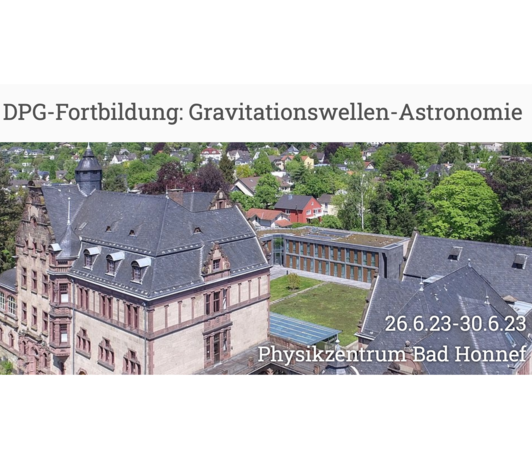DGP Teacher Training: Gravitational Wave Astronomy
Workshop
- Start: Jun 26, 2023 12:30 PM (Local Time Germany)
- End: Jun 30, 2023 02:00 PM
- Speaker: various
- Location: Physikzentrum Bad Honnef, Hauptstraße 5, 53604 Bad Honnef
- Host: Prof. Dr. Karl-Heinz Lotze, Prof. Dr. Andreas Malmendier, Dr. Frank Ohme, Dr. Gudrun Wanner

Gravitational waves are tiny distortions of space-time that propagate through space at the speed of light. According to Einstein's general theory of relativity, they are generated in a variety of astronomically interesting processes, such as the merging of neutron stars and black holes, but also in the early universe shortly after the Big Bang. Gravitational-wave astronomy aims to use gravitational waves to obtain information about compact celestial bodies such as black holes and neutron stars, about supernovae, and about processes in the early universe.
Direct detection of gravitational waves is the goal of large international detector collaborations such as LIGO, GEO600, and VIRGO. The gravitational-wave telescopes are giant Michelson interferometers that apply the latest findings in quantum optics. The LIGO consortium first directly detected gravitational waves from two colliding black holes in September 2015. In 2017, Barry Barish, Kip Thorne and Rainer Weiss were awarded the Nobel Prize in Physics for this achievement.
Indirect evidence for the existence of gravitational waves, however, emerged as early as the 1980s through the observation of a double pulsar. Theoretically predicted radiation losses due to gravitational waves must result in a reduction of the distance between the two stars, which in turn should reduce their orbital period. This reduction of the orbital period could actually be confirmed by radio astronomical observations, for which already in 1993 Joseph Taylor and Russell Hulse were honored with the Nobel Prize.
Gravitational-wave astronomy also offers much from a pedagogical-didactic point of view. Fundamental theories of physics such as mechanics, optics, wave theory, relativity, and astronomy combine here with data analysis and a variety of simulations, projects, and curricula available online that can promote the treatment of gravitational-wave astronomy as a multimedia and interactive learning project.
The talks and workshops will highlight some important concepts of all facets of gravitational-wave astronomy and develop ideas and suggestions for teaching physics. In particular, we will ask what new astronomical insights we owe to the first years of direct observation of gravitational waves and what plans there are for building new detectors. Historical aspects will also play a role.